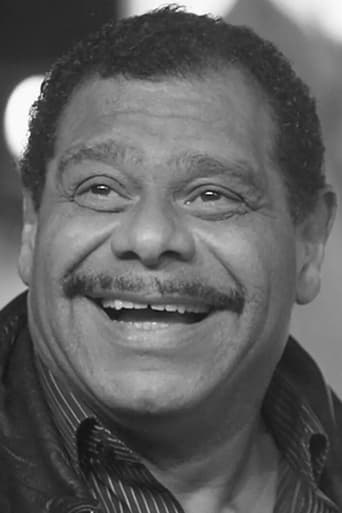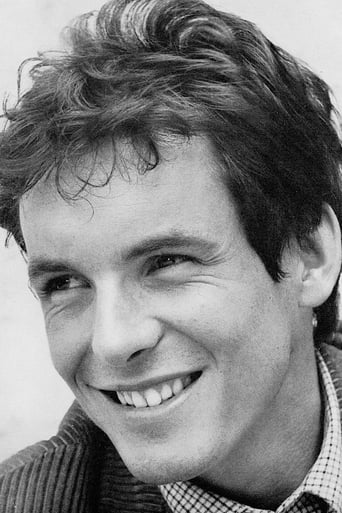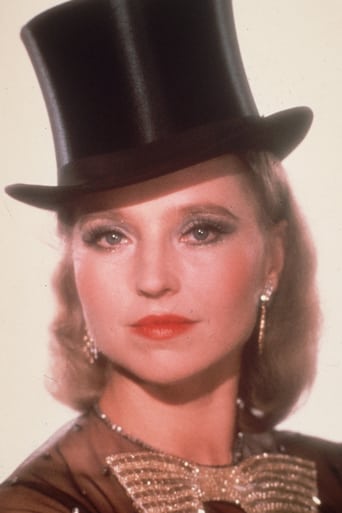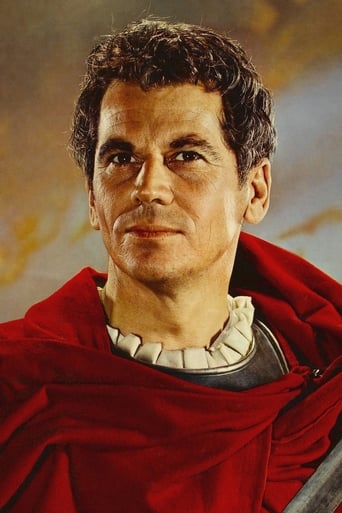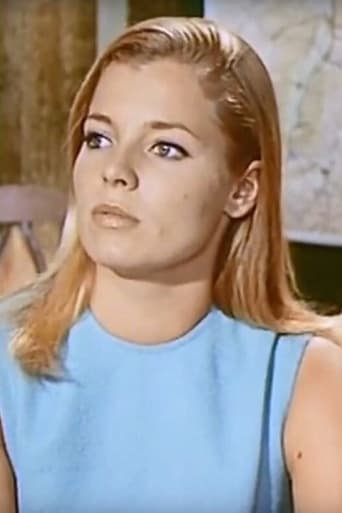PlatinumRead
Just so...so bad
Pacionsbo
Absolutely Fantastic
Casey Duggan
It’s sentimental, ridiculously long and only occasionally funny
Geraldine
The story, direction, characters, and writing/dialogue is akin to taking a tranquilizer shot to the neck, but everything else was so well done.
Richard Chatten
Never released commercially, 'Whity' remains one of Fassbinder's least seen films, and when spoken of it is usually with mild incredulity since the thing is reportedly a western. Naturally it's a western the like of which English-speaking audiences have never seen before (or at any rate since 'Red Garters'), but one that would look less eccentric to a German audience used to the popular Karl May adaptations of the sixties in which men are men and women are German. Although there are nods towards Sergio Leone - notably with Peer Raben's score - it plainly owes more to Gillo Pontecorvo's 'Queimada!' (1969) and to the 'slavery' genre of the seventies that began with Herbert Biberman's 'Slaves' in 1969 and reached its apotheosis with 'Mandingo'. Sumptuously designed by Kurt Raab and fluidly shot in widescreen and Eastmancolor by the late Michael Ballhaus, visually it anticipates the saturated colours of Fassbinder's final extravaganzas like 'Lili Marleen' and 'Querelle' with the cast resembling waxworks. It effectively does for westerns what 'Der Amerikanische Soldat' did for gangster movies, but is far less fun; although Fassbinder's own appearance as a macho, whip-wielding cowboy is as funny as anything to be found in 'Carry On Cowboy'.
Perception_de_Ambiguity
* For people who haven't seen the film I recommend skipping the first part of the comment to start reading right at - The Style - * What's noteworthy is how much more this relatively early Fassbinder has in common with his later films such as the BRD trilogy than with anything he did before. For example the fact that the main character is trying to integrate into a family/society against all odds, with fatal consequences. Not only do those families/societies reject the main characters of the RWF films in question, but those systems turn out to be miserable and integration into them turn out to be undesirable. The propagated Weltanschauung is downright pessimistic, with no realistic hope anywhere in sight.So the movie's title character Whity is trying to integrate, even to the point of lacking much of a personality. He doesn't care if he is black or white, or even straight or gay, he just wants to be a part of something that is bigger that himself.The Themes - Interestingly the film doesn't seem to be much concerned with racial issues. I don't see Whity to be representative of the black man in America, but rather it uses a black man in the West as an example of slavery and a man who tries to integrate into a system that doesn't want him for superimposed reasons, all the while he is more competent than most other people around him.The (white) members of the Nicholson family all have makeup that makes them look sickly pale, which could be to empathize those people's degeneration, compared to Whity. They are free, he is not, they have power, he hasn't, purely because of superficial reasons and not because they are actually stronger.What's also important is the capitalism versus love theme. In the family everyone is ridden by greed, money is their biggest concern and this reflects their decadence. Whity doesn't have much desires at all, he is the best example of happiness in slavery. He doesn't know a better life, so he is satisfied with his position. That was until he found love. It's partly through this love that he realizes the degenerated state of his family (the Nicholsons) and it's love that is enough of a substitute that it makes him want to radically leave behind his family in the end.But the movie doesn't give a solution for Whity's tragic situation, in the end he leaves the system that he fought to be a part of all along, just to go into the vastness of the desert (a non-system, if you will, a place where money and power doesn't matter), just to die, suggesting that there in fact is no solution, other than death. This is why I find the film to be extremely pessimistic. Whity has found love, but not only is it not considered a solution, but it implies that there is none, by Whity consciously deciding to end his life, basically.The Style - As for the style, obviously the film is much more inspired by Spaghetti Westerns than by American ones, which starts with the opening credits with the names flying towards the audience, and continues with the intentionally slow-paced nature of the film, its melancholic atmosphere, and the exaggerated ambient sound. In fact, it's directly reminiscent of Leone, but the big difference is the small scale of RWF's film. I found the slow pace more tedious than anything else. It's too much of an imitation and not enough its own thing.As good as Ballhaus' camera work is on its own, the concept of frozen subjects captured in fluid images doesn't work well if there is little (appropriate) content to back it up, not to mention that this is pretty much the opposite of Leone's cinematography, which is mostly rigid camera where even the smallest protagonist movement looks epic. If Leone's camera moves it is to follow the protagonist, not to pan to another protagonist. He fearlessly employed a cut to show another character, which made every character the star of his own shot.The Resume - Although the film certainly isn't devoid of appealing themes, the way it is I can't say that it tells an interesting story. Apart from Whity all the characters are just too empty, they are just pawns in Whity's story, which wouldn't be as bad if there weren't so many scenes in which he isn't much more than a spectator or isn't even present.As implied before, the content simply doesn't lend itself to a Leonesque Western. A Leone Western lends itself to strangers being unpredictable, danger-laden atmosphere and situations, and gunslinging, it doesn't lend itself to internal family affairs, everyday life and character studies. I would consider 'Whity' a failed experiment, Fassbinder's story-telling sensibilities combined with an imitation of Leone's style is a system into which integration is undesirable.
MARIO GAUCI
When is a Western not really a Western? When it’s directed by Fassbinder! WHITY is only my sixth film from the so-called German wunderkind: I admire Fassbinder for his prolific and versatile output, though I’ve yet to be won over completely by a film of his; frankly I was hoping this would prove to be the one – but, as it turned out, I couldn’t have been more wrong! For the record, I’ve got four more titles from him to watch: still, considering my dismal experience with WHITY (especially since I had fully expected it to be the most accessible of the lot!), I don’t know when I’ll muster the courage to get to them now…even if DESPAIR (1978) is a reasonably enticing title, given the participation of Dirk Bogarde and the Vladimir Nabokov source.To be fair, the Western ambiance is delivered in spades throughout. The film was stunningly shot in Widescreen – by Michael Ballhaus (later a valued collaborator of Martin Scorsese) – in Almeria, location site of many a Spaghetti Western. It generally has the right feel for time and place with regards to settings and wardrobe, while the all-important score is highlighted by a decidedly infectious riff. Even so, the repertoire of English-language ballads (the bulk of the film, of course, is in German) allotted to chanteuse/prostitute Hanna Schygulla – not to mention her own affected delivery – is inappropriately modern and comes across as unintentionally laughable! Schygulla was a fixture in Fassbinder’s work; the film also features Ron Randell (best-known, if at all, for playing Christ’s attorney[!] in Nicholas Ray’s KING OF KINGS [1961]) and Ulli Lommel (who later graduated to directing himself, notably TENDERNESS OF THE WOLVES [1973] and THE BOOGEYMAN [1980]).The overriding pretentiousness at work here is palpable above all in the film’s lethargic, indeed deadly, pace (never have I seen a movie in which the characters moved more s-l-o-w-l-y!). Besides, it isn’t helped by unsympathetic (even annoying) characters – mostly members of a dysfunctional family (and particularly the pasty-faced, frizzy-haired sons of landowner Randell) – indulging in all manners of transgressions (from such commonly-depicted capital sins as greed, lust and murder down to nymphomania, masochism, interracial relationships and incest!). In the midst of all this is an unsavory gay subtext which, inevitably, seems to be on the agenda of virtually all directors so inclined in real-life (but becoming obviously more pronounced in the liberalized modern cinema)! The plot, for what it’s worth, is reminiscent of Pier Paolo Pasolini’s THEOREM (1968) – coincidentally another gay parable – as the life of everyone involved is influenced in some way by the household’s black manservant (the character bears the ironic titular nickname but is also curiously underwritten and inexpressive), who’s actually the fruit of Randell’s illicit affair with his frumpy colored maid! The fact that each, in turn, pleads with him to slay the other could have turned this into a pointed black comedy – but the film is simply too labored and deliberately self-conscious for the subtlety intrinsic to such refined treatment... In the end, one should note that 1971 saw a boom of arty Westerns with other such offerings as Alexandro Jodorowsky’s EL TOPO, Peter Fonda’s THE HIRED HAND and Robert Altman’s McCABE AND MRS MILLER. As for WHITY (whose shooting, by the way, inspired Fassbinder’s own BEWARE OF A HOLY WHORE [1971]), I had owned the Fantoma DVD – which includes an Audio Commentary from Ballhaus and Lommel – for quite a while before actually sitting down to view it. I’d purchased the disc through the company’s own website during a sale but, as I said, could only manage to find a slot for it in my hectic/eclectic schedule after having enjoyed a couple of equally stylized (but far more satisfying) Spaghetti Westerns – DEATH SENTENCE (1968) and YANKEE (1966) – earlier this week.
ALauff
Seemingly a triumphant parable about a slave's emancipation from a cruel, inbred patriarchy, Fassbinder's outré Spanish Western employs a unique hybrid of incisive, scabrous character examination, eerie stretches of silence, and a deadpan editing scheme that makes empathy desirable but never attainable. The eponymous character is the son of despotic aristocrat Ben Nicholson, whose children look and behave like grotesque zombies (their faces are caked with a putrid green sheen of powder), whose wife is a sexually manipulative hussy, and whose one-time mistress (and Whity's mother) is the other servant in the house, a proud anthem-singing woman whose charcoal-darkened face renders her an indistinguishable void.This artificial hue also serves as a contrast to Whity (Günter Kaufmann), who is caught between fealty to the father and his tradition of old money, and his mother's tradition of slavery. In the film's first scene, Whity tells his mother that "black music" isn't welcome in the house; she responds by spitting in his face and derisively labeling him "Whity." Such an extreme example of stratification illustrates Whity's dual identity and his confusion about how he'd like to be perceived. The mother's rebuke is especially cruel when one considers her role in his figurative schizophrenia (copulating with her white master) and the selfsame compromise of racial identity inherent in his conception.There are further signs of ambiguity: he dresses to the specifications of his masters, looking the part of an Uncle Tom in the opening tilt shot, which pans slowly up Whity's body from his spit-shined shoes to his immaculate red dust jacket; he proudly pledges his gratitude after severe beatings; and he may be romantically involved with Nicholson's disabled son. Whity's brutal turn in the final sequence, in which he methodically executes the entire family, is a particularly definitive choice of identity, though hardly, from an outside perspective, one of vindication or clarity given Whity's contrary choices (or are they necessities of survival?) throughout the film. Like the other two Fassbinder films I've seen—The American Soldier and Rio Das Mortes—character motivations, intentions, and actions are anything but clear-cut, and the director is prone to self-amusing stretches of bizarre revelry. But also similar to those films is a sense of spontaneity and social conscience along with an analytical rigor that reminds me of a less-polished and less self-regarding Godard. If his later films are equally resistant to the cinema of spectacle (of which the closest he's come is the extraordinary ending to The American Soldier), I may yet come to fully appreciate this most enigmatic auteur.

